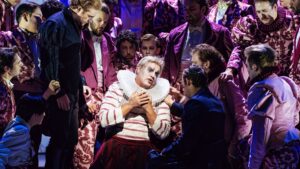Our Own Gualtier Maldè reflects on last night’s Met Lucia:
The Met has often been accused and rightly so of ignoring young talent and waiting too long to hire up-and-coming new stars while hanging on to declining old favorites well past their sell-by date. Occasionally a promising new talent from the Young Artists Program will blossom quickly and get chances – Dwayne Croft fifteen years ago is an example.
However, it was a surprise when James Levine announced 26 year-old Stephen Costello for one performance of Edgardo in Lucia this season. He had definitely made an impression as Arturo on opening night and I have been told did impressively subbing for Giordani as Edgardo in some early rehearsals. It was with a mix of trepidation and excitement that I attended last night’s performance. Making a starring role debut at age 26 in a house the size of the Met is a daunting experience for anyone.
Well, how was he? This much can be said – he immediately got the audience on his side and got the biggest ovation at the end (admittedly many family members, schoolmates and friends were in the audience but not that many). His youth, sweet timbre, precocious poise and emotional involvement communicated to the audience. However, the role of Edgardo, though lyric, is demanding with a wide range of dynamics, vocal coloration and requires both declamation and floated legato. Costello’s voice seemed a size too small for the role in a house this large. Though he wasn’t inaudible, he definitely seemed lightweight vocally. He seemed boyish and slight next to Annick Massis who is hardly a Lucia in the Sutherland/Callas heroic mold.
The elegant phrasing and poised musicianship were juxtaposed against a voice that could turn shallow and a touch insecure when pressures mounted. Lyrical moments like “Verranno a te” and “Fra poco a me ricovero” were sweet and pleasing. Declamatory moments like the outbursts in the “maledizione” scene and confrontation with Enrico in “Wolf’s Crag” found the young man working close to his limits. The fact that he didn’t push well beyond those limits and lasted in fairly fresh form to the end of the opera speaks well for his pacing and intelligence. A naturally appealing and graceful stage presence, he gained in dramatic authority as the evening progressed culminating in a moving death scene.
However, at this juncture he might be wise to leave the Edgardo to smaller theaters and concentrate on roles like Ernesto, Nadir and Nemorino that could capitalize on his soaring upper register and boyish charm and let himself grow into roles like the Duke of Mantua, Edgardo, Rodolfo and Alfredo with time.
A salutory example currently singing on the Met roster is Matthew Polenzani who started modestly at the Met seven or eight years ago singing parts like Jacquino and Lindoro and now in his thirties is moving into Romeo, Edgardo and Alfredo internationally with superb notices. It isn’t a splashy overnight star trajectory but it worked for him and the Met and when the big star roles came, he was fully formed and ready to do them and himself full justice.
The evening really belonged to the elegant Lucia of French coloratura Annick Massis. Her voice is creamier and softer-textured than that of Natalie Dessay but she has a fuller and more reliable upper extension. A patrician stage figure, her acting was detailed and intelligent but lacked the “in the moment” intensity and spontaneity that Dessay brings to her work. There were pluses both musical and dramatic to Massis’ more calculated approach – she never lost vocal poise and beauty and her performance was consistent and beautifully paced.
The loss of some dramatic excitement definitely had musical gains and resulted in a performance that gave overall pleasure. The flute obbligato in the cadenza of the mad scene was reinstated for her as was about 95% of the traditional Mathilde Marchesi cadenza minus the top E flats. Those were abundant elsewhere and held to exciting effect.
Kwiecien shows greater command and suavity in his Enrico, singing more judiciously in the beginning but having lots of power when needed – especially in his climactic top notes. John Relyea has a hint of graininess and dryness in his tone that is worrying in an artist who is still fairly young. I miss the vocal velvet of his earlier days. He was solid but not exciting.
Mr. Costello came through his trial by fire with grace and made some new fans. Now, he needs to pace himself wisely singing lighter roles at the Met and letting his voice and technique mature in the smaller and medium size houses until he is ready to tackle the major lyric repertoire here and internationally. The stuff was definitely there last night, but in embryo. — Gualtier Maldè


